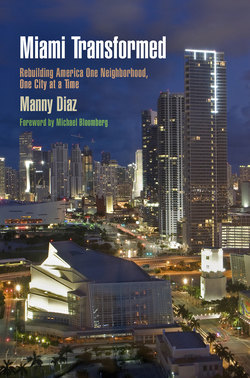Miami Transformed

Описание книги
Six-year-old Manuel Diaz and his mother first arrived at Miami's airport in 1961 with little more than a dime for a phone call to their relatives in the Little Havana neighborhood. Forty years after his flight from Castro's Cuba, attorney Manny Diaz became mayor of the City of Miami. Toward the end of the twentieth century, the one-time citrus and tourism hub was more closely associated with vice than sunshine. When Diaz took office in 2001, the city was paralyzed by a notoriously corrupt police department, unresponsive government, a dying business district, and heated ethnic and racial divisions. During Diaz's two terms as mayor, Miami was transformed into a vibrant, progressive, and economically resurgent world-class metropolis. In Miami Transformed: Rebuilding America One Neighborhood, One City at a Time , award-winning former mayor Manny Diaz shares lessons learned from governing one of the most diverse and dynamic urban communities in the United States. This firsthand account begins with Diaz's memories as an immigrant child in a foreign land, his education, and his political development as part of a new generation of Cuban Americans. Diaz also discusses his role in the controversial Elián González case. Later he details how he managed two successful mayoral campaigns, navigated the maze of municipal politics, oversaw the revitalization of downtown Miami, and rooted out police corruption to regain the trust of businesses and Miami citizens. Part memoir, part political primer, Miami Transformed offers a straightforward look at Diaz's brand of holistic, pragmatic urban leadership that combines public investment in education and infrastructure with private sector partnerships. The story of Manny Diaz's efforts to renew Miami will interest anyone seeking to foster safer, greener, and more prosperous cities.
Отрывок из книги
University of Pennsylvania Press Philadelphia
Make big plans; aim high in hope and work, remembering that a noble diagram once recorded will never die, but long after we are gone will be a living thing.
.....
We stayed at the homes of our host teams. As a result, I learned that Americans had eggs and ham or bacon and muffins for breakfast. This was a real culture shock. In my family, breakfast consisted of just coffee with milk and Cuban toast—that’s it. What I was eating for breakfast in those homes in Alabama was what we would be lucky to have for dinner at my house. I remember laughing with my parents afterward, saying, “I love these Americans, they sure know how to eat breakfast.” Little did I know that I was putting them in an awkward spot. “Well son, we’d love to feed you that way too, but we just can’t afford it.” To this day, breakfast continues to be my favorite meal. It still consists of café con leche and Cuban toast, but it also includes eggs and ham, the best of both worlds.
Traveling with my team did a lot to expand my horizons, not just when it came to food. After playing and winning in Birmingham, we went to Kingsville, Texas, for the finals. Kingsville had a large Mexican American population that welcomed us with open arms. Because we spoke Spanish and had a strong sense of pride in our shared cultural heritage, they absolutely fell in love with us and we with them: we became “their” team. They would show up at our games, and invite us for barbecues after the game. For us, it was like, “Hey, they are just like us!”
.....
